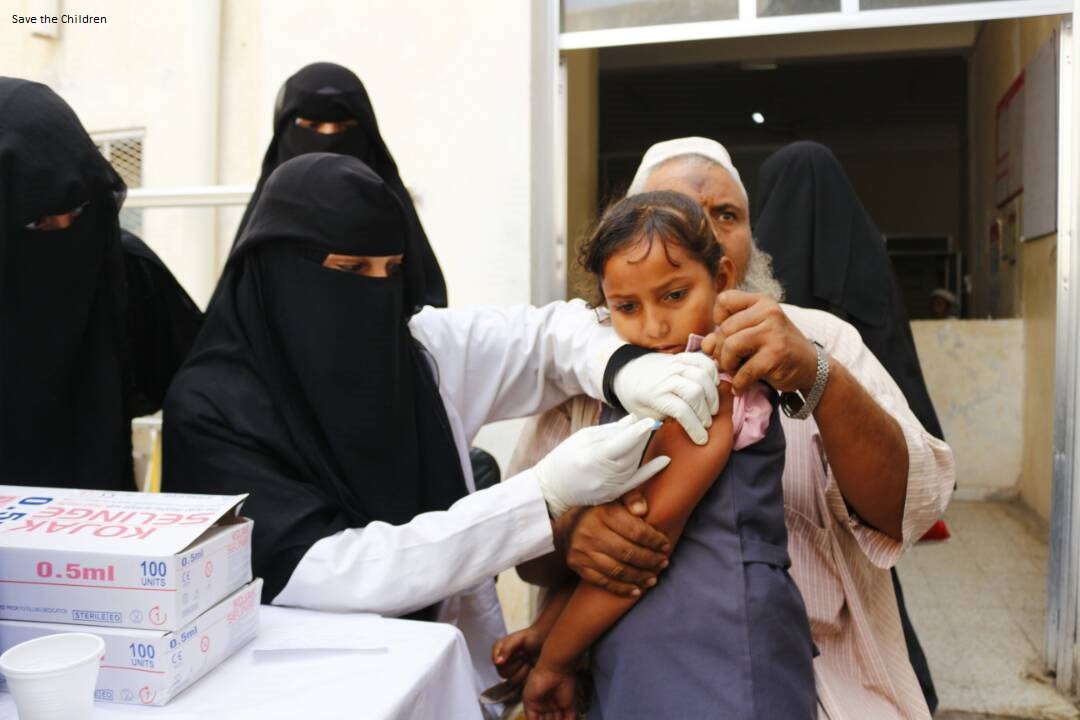In December an outbreak of diphtheria was reported in Yemen, another blow for people living in a country already experiencing the world’s worst humanitarian crisis.
More than two years of conflict has left around 8 million people on the brink of famine, and a cholera epidemic has infected 1 million. The Start Fund is responding to this latest threat, rapidly sending money to help people after being alerted to this, its 200th alert, on 20th December 2017.
The day after the alert was raised, by Start Network members - Relief International and Save the Children - the Start Fund decision making team decided to activate the Fund. Most diphtheria cases and deaths have been reported in Ibb governorate in the south, but the outbreak is spreading quickly to other governorates. So acting immediately could reduce the spread of the disease.
After the decision to activate the Start Fund, members were then given 24 hours to submit proposals for a 45-day rapid response. Both the Relief International and Save the Children proposals were awarded funding for projects that focus on the prevention and treatment of diphtheria in regions where there was no humanitarian support.
The response on the ground
Immediately Save the Children launched a diphtheria emergency response project in the Hudaydah governorate, which has the second highest rate of diphtheria infection and death in Yemen. Training sessions were delivered for health care providers on treatment protocols, reporting of suspected cases and on the establishment of isolation centers.
As part of their response, Save the Children also launched awareness campaigns along with diphtheria education sessions at clinics, schools, local markets, mosques and at community gatherings.
Relief International’s response spanned over three governorates: Sana'a, Hajja and Amran, focusing on providing refresher training in health facilities on treatment protocols. They also reached out to community health volunteers to run community awareness training with them.
Both projects will end in on 6th February and will aim to reach 577,752 people.
Rima is four years old and was admitted to a Save the Children treatment center with suspected diphtheria. She had a thick covering at the back of her throat that was making it hard for her to breathe. She is responding well to treatment and has been vaccinated.
The crucial role of the Start Fund in Yemen
The aim of the Start Fund response in Yemen is to stem the diphtheria outbreak by using a combination of preventive and curative interventions. The community will be better educated to ensure early identification of anyone infected, timely intervention of suspected cases and it ensures precautionary measures are taken.
The Start Fund enabled Relief International to kick start many humanitarian activities which were delayed because of slow international response to the crisis in Yemen. This includes training of rapid response teams as well as improving awareness activities which are targeting more than 400,000 people. While helping Save the Children with much needed funding to respond to the burgeoning diphtheria crisis. Muhsin Siddiquey, Director of Programme Development & Quality at Save the Children Yemen said,
“Continued assistance from the Start Network in 2018 is needed to improve existing facilities, purchase medical equipment and attract specialist medical staff, increase volunteer numbers and conduct educational campaigns. This will be essential in helping to stop the spread and deaths associated with the diphtheria outbreak in Yemen”
The humanitarian outlook for Yemen in 2018
Mark Lowcock, UN Humanitarian and Relief Chief, is not alone in describing Yemen as the worst humanitarian crisis in 50 years, explaining that people in the war-torn country are facing a situation that "looks like the Apocalypse”.
Through the Start Fund, there has already been a response in Yemen to the worst cholera outbreak ever recorded. A record one million people have reported been infected so far. Now the country faces the rise of diphtheria, another disease that the world should not be seeing in 2018.
"The water shortage is currently the most crucial issue, the lack of proper sanitation has increased the risk of water-borne diseases, such as cholera" said Jason Lee, Save the Children's Deputy Director of Program Operations in Yemen. Aid agencies are expecting to see an increase in both the frequency and intensity of other diseases, because of the destruction of the health infrastructure. However movement restrictions mean that it is difficult for humanitarian aid to reach people.
There are more than two million internally displaced people and the United Nations Office for the Coordination of Humanitarian Affairs (UN OCHA), says 76 per cent of the population is in need of humanitarian assistance.
The Start Fund is a pooled fund which is backed by UK Aid, the Irish Ministry of Foreign Affairs, the Dutch Ministry of Foreign Affairs, Belgian Development Cooperation and the European Commission’s humanitarian aid department.
Read more about the Start Fund response to Cholera in Yemen
View the active alert for Diphtheria in Yemen
Read more about the Start Fund

